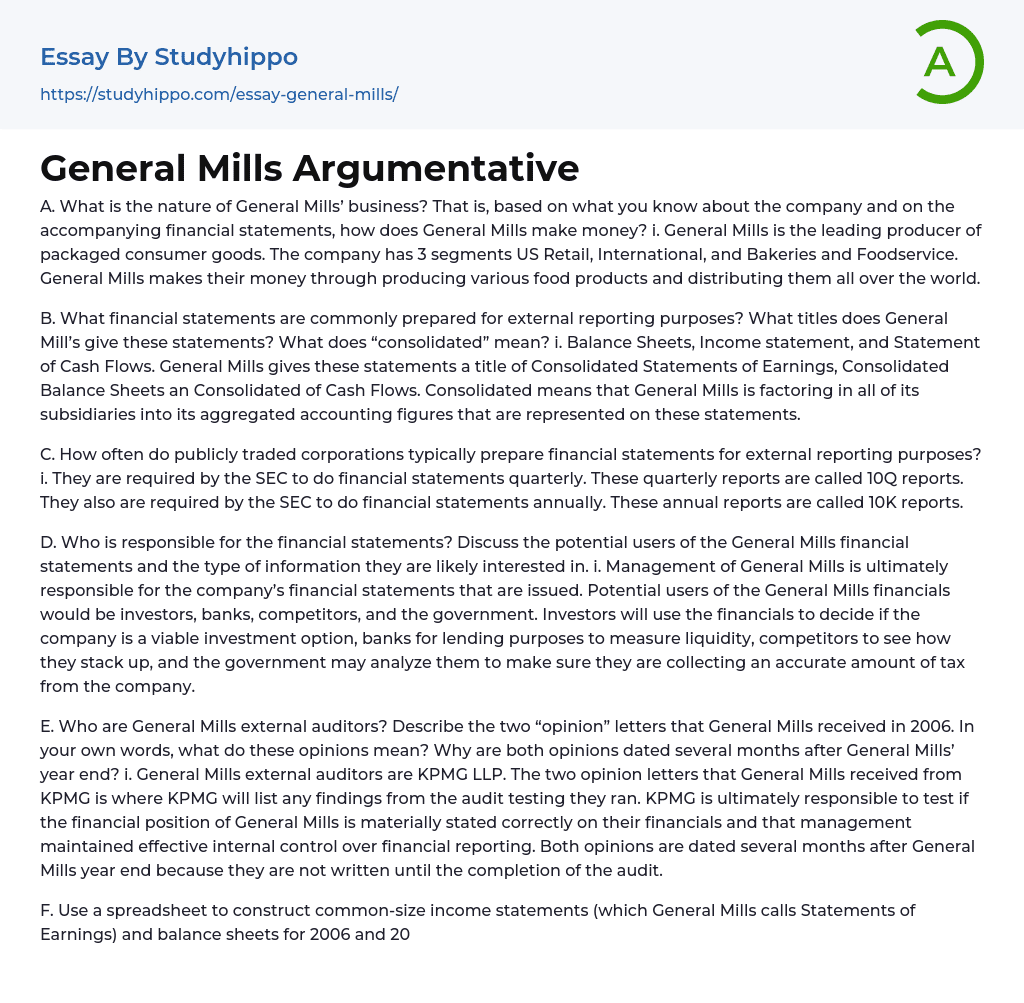A. What is the nature of General Mills’ business? That is, based on what you know about the company and on the accompanying financial statements, how does General Mills make money? i. General Mills is the leading producer of packaged consumer goods. The company has 3 segments US Retail, International, and Bakeries and Foodservice. General Mills makes their money through producing various food products and distributing them all over the world.
B. What financial statements are commonly prepared for external reporting purposes? What titles does General Mill’s give these statements? What does “consolidated” mean? i. Balance Sheets, Income statement, and Statement of Cash Flows. General Mills gives these statements a title of Consolidated Statements of Earnings, Consolidated Balance Sheets an Consolidated of Cash Flows. Consolidated means that General Mills is factoring in all of its subsidi
...aries into its aggregated accounting figures that are represented on these statements.
C. How often do publicly traded corporations typically prepare financial statements for external reporting purposes? i. They are required by the SEC to do financial statements quarterly. These quarterly reports are called 10Q reports. They also are required by the SEC to do financial statements annually. These annual reports are called 10K reports.
D. Who is responsible for the financial statements? Discuss the potential users of the General Mills financial statements and the type of information they are likely interested in. i. Management of General Mills is ultimately responsible for the company’s financial statements that are issued. Potential users of the General Mills financials would be investors, banks, competitors, and the government. Investors will use the financials to decide if the company i
a viable investment option, banks for lending purposes to measure liquidity, competitors to see how they stack up, and the government may analyze them to make sure they are collecting an accurate amount of tax from the company.
E. Who are General Mills external auditors? Describe the two “opinion” letters that General Mills received in 2006. In your own words, what do these opinions mean? Why are both opinions dated several months after General Mills’ year end? i. General Mills external auditors are KPMG LLP. The two opinion letters that General Mills received from KPMG is where KPMG will list any findings from the audit testing they ran. KPMG is ultimately responsible to test if the financial position of General Mills is materially stated correctly on their financials and that management maintained effective internal control over financial reporting. Both opinions are dated several months after General Mills year end because they are not written until the completion of the audit.
F. Use a spreadsheet to construct common-size income statements (which General Mills calls Statements of Earnings) and balance sheets for 2006 and 2005. Common-size income statements scale each income statement line item by net sales. Common-size balance sheets are created by dividing each figure on a given year’s balance sheet by that year’s total assets, thereby creating a balance sheet on a “percent of assets” basis. You will use these common-size statements in answering several of the questions below.
- Accounts Receivable essays
- Auditor's Report essays
- Balance Sheet essays
- Costs essays
- Financial Audit essays
- International Financial Reporting Standards essays
- Tax essays
- Accountability essays
- Cash essays
- Principal essays
- Management Accounting essays
- Internal Control essays
- Accounting Software essays
- Cash Flow essays
- Investing essays
- Asset essays
- Depreciation essays
- Discounted Cash Flow essays
- Foreign Direct Investment essays
- Funds essays
- Internal Rate Of Return essays
- Revenue essays
- Day Trading essays
- Futures Trading essays
- Capital market essays
- Million essays
- Payment essays
- Rate Of Return essays
- Funding essays
- Hedge Fund essays
- Accounting essays
- Andrew Carnegie essays
- Automation essays
- Business Cycle essays
- Business Intelligence essays
- Business Model essays
- Business Operations essays
- Business Software essays
- Cooperation essays
- Cooperative essays
- Corporate Social Responsibility essays
- Corporation essays
- Customer Relationship Management essays
- Family Business essays
- Franchising essays
- Harvard Business School essays
- Harvard university essays
- Human Resource Management essays
- Infrastructure essays
- Inventory essays




